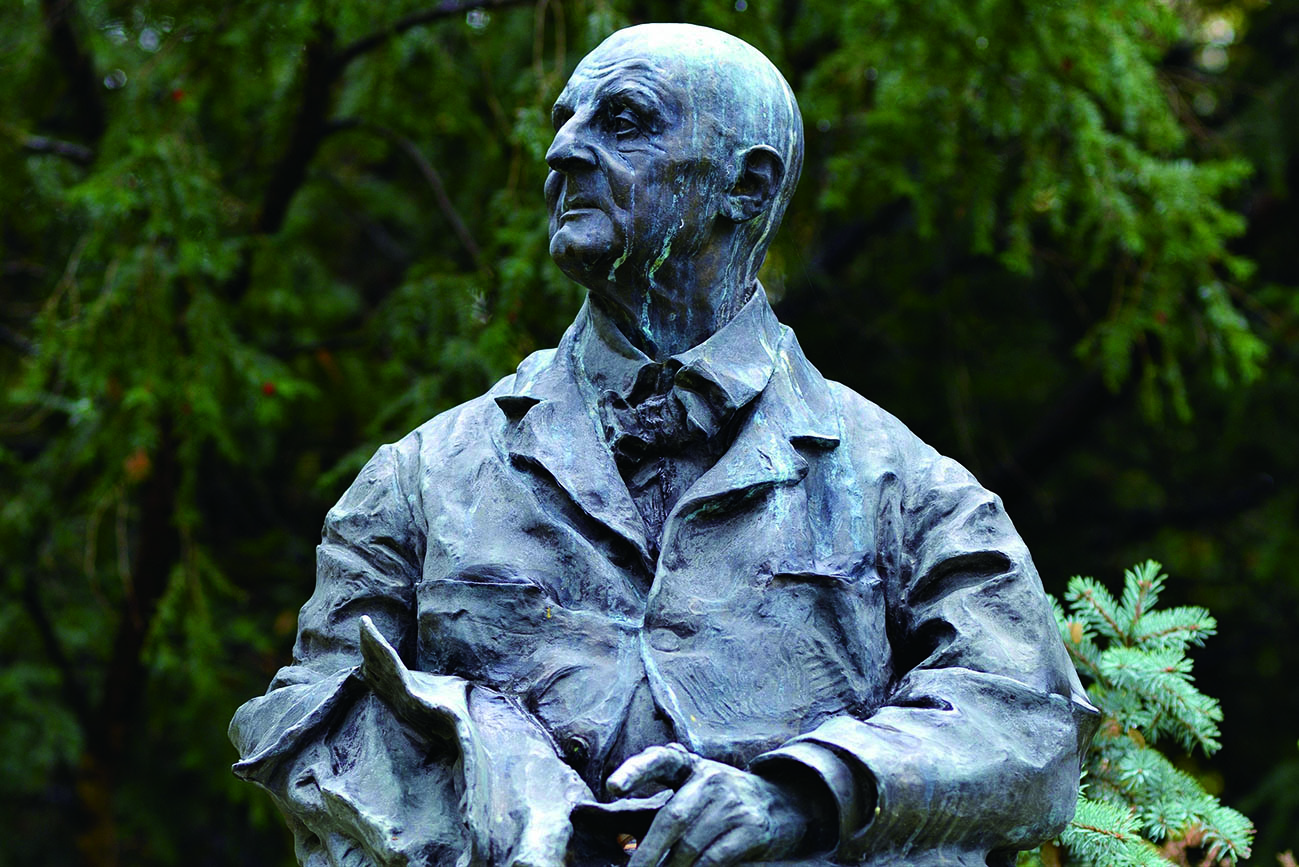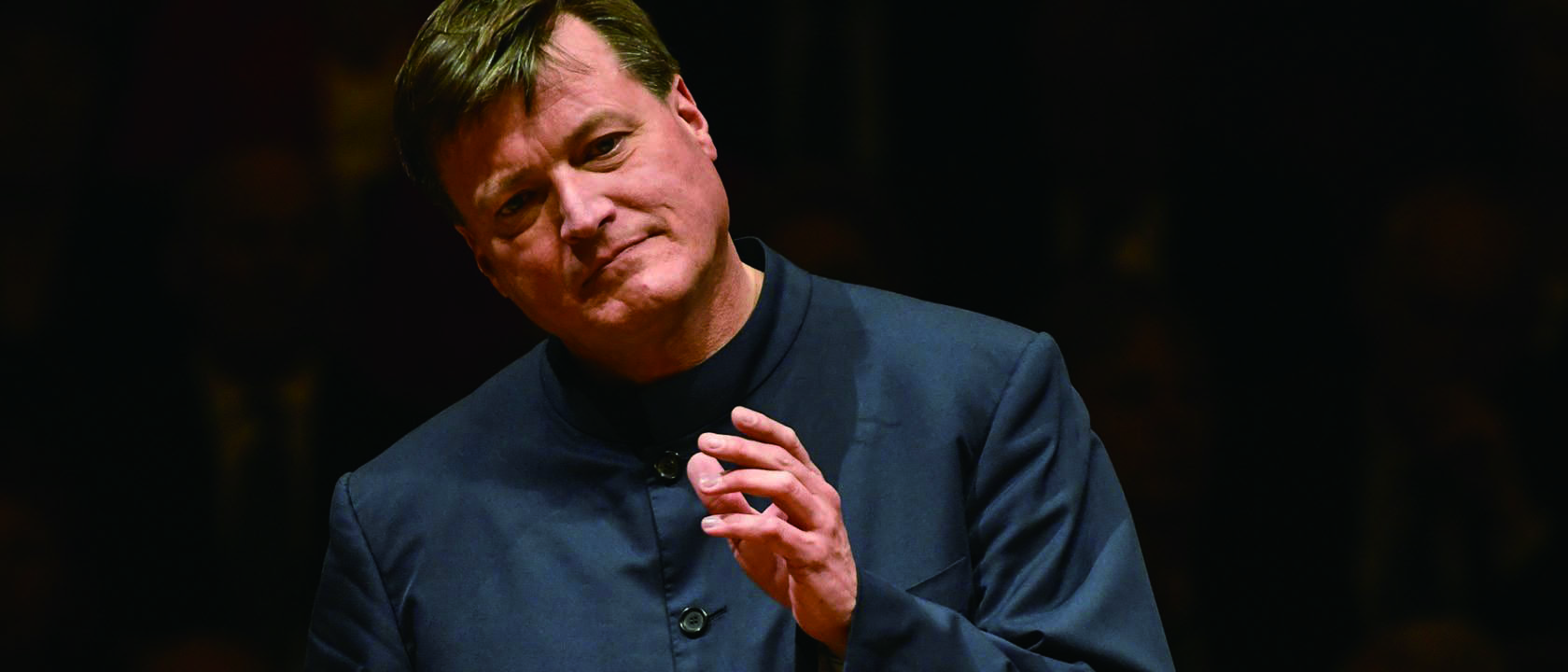노먼 레브레히트 칼럼 | SINCE 2012
영국의 평론가가 보내온 세계 음악계 동향
‘독수공방’ 독일인은 세계시민으로 나아갈 수 있을까?
다가오는 브루크너 탄생 200주년을 기대하며

브루크너(1824~1896), 오스트리아 빈 시민 공원에 위치한 브루크너 동상
다가올 악천후에 대한 경고장을 전한다. 내년 안톤 브루크너 탄생 200주년을 앞두고 그의 교향곡 강풍이 불 예정이다. 이 중 아홉 곡은 번호가 매겨져 있고 두 곡은 ‘0번’과 ‘00번’으로 불린다. 이에 혼란을 가중하자면 잘못 이해한 애호가와 고집불통 지휘자들로 인해 각각의 교향곡은 최대 아홉 개까지 수정 판본이 존재한다. 진정한 브루크너를 걸러내기란 쉽지 않다.
신랄한 지휘자였던 한스 폰 뷜로는 브루크너를 “반은 천재, 반은 바보”라 일컬었는데, 그다지 틀린 말은 아니다. 요하네스 브람스는 브루크너의 작품을 “관현악계의 보아뱀”이라 일축했고, 빈의 평론가 에두아르트 한슬리크는 브루크너의 교향곡 8번을 “끔찍한 고양이 울음소리”라며 깔아뭉갰다. 영국의 재담가 토머스 비첨은 또 다른 브루크너의 교향곡에서 “여섯 번의 임신과 최소 네 번의 유산이 적혀있다”라고 말했다. 혼란하고 불분명하며 애처로울 만큼 연약한 작곡가를 짓밟는 일은 무척이나 쉬웠다.
그러나 놀랍게도 나는 크리스티안 틸레만(1959~)과 빈 필하모닉에서 시작하여 전 세계로 퍼져나갈, 내년 브루크너 해의 교향곡 사이클을 고대하고 있다. 맹목적인 신념이 있다면 브루크너 작품 공연은 성공할 테고, 틸레만과 빈필은 자기 불신이 없는 팀이다.
미성숙한 사내에게 깃든 신비한 음악
브루크너를 향한 나의 귀를 열어준 이는 지휘자 클라우스 텐슈테트(1926 ~1998)였다. 그는 브루크너의 마지막 세 곡의 교향곡으로 쉬츠부터 슈만에 이르기까지 독일 음악의 완벽한 개요와 브루크너만의 천재적인 틀을 보여주었다. 브루크너 감상을 인도한 텐슈테트를 떠난 후엔 신비로운 미로가 펼쳐졌다. 의미가 무엇이든 음악이 압도적이었다. 카를로 마리아 줄리니의 교향곡 9번, 클라우디오 아바도의 교향곡 5번, 헤르베르트 폰 카라얀의 교향곡 7번 음반이 그러하다. 빈 출신의 뉴질랜드인인 게오르크 틴트너(1917~1999)가 녹음한 전집(Naxos)도 있는데, 이는 뛰어난 시카고 심포니와 함께한 다니엘 바렌보임의 세련된 노력보다도 탁월하다. 나는 브루크너를 사랑한 편은 아니었지만, 이러한 음반을 접한 후, 독일인 영혼의 내면 후미진 곳까지 다가간 그의 독특한 접근에는 경탄을 금치 못했다.
브루크너는 인간적으로는 볼썽사나운 사내였다. 농부의 자식으로 태어나 오스트리아 북부의 린츠 근처에서 자란 그는 마을 오르간을 연주하고 수도원에서 수학하며 30대 중반이 되어서야 처음 빈에 데뷔한다. 모차르트와 슈베르트가 이미 음악 인생을 완성하고 떠나 버린 나이였다. 대학에서 교사로 근무하며 빵과 치즈로 식사를 해결했던 그는 결혼이나 연애를 감당할 형편이 되지 못했다. 일기에 기록된 사춘기 소녀들을 향한 그의 욕정은 감정적으로 미성숙하고 사회적으로 배제된 그의 면면을 보여준다. 브루크너 본인의 말에 따르자면, 신은 자신에게 재능을 주었으며 언젠가는 그에 대해 책임을 져야 할 것이었다. 그는 신실한 가톨릭 신자였으며, 그의 행동은 믿기 어려울 정도로 순진했다.
박수갈채를 받기 위해 무대 위로 불려 나온 브루크너는 유명 지휘자 한스 리히터에게 일종의 팁으로 동전 몇 닢을 쥐여 주었다. 빈 필하모닉이 그의 교향곡 3번을 초연할 때 브루크너는 지휘봉을 손에 든 채 무력하게 포디엄에 서서 악장의 시작 신호만을 기다렸다. 자신의 아부로 민망해하던 리하르트 바그너에게 서명한 악보를 건네기도 했다.
브루크너 교향곡 해석 논쟁
교향곡 3번에는 훗날 구스타프 말러가 걸을 숲과 초원이 느껴진다. 브루크너는 한때 본인 몫의 치즈 샌드위치를 가난한 학생이었던 말러와 나누기도 했다. 한 시간을 넘기는 교향곡 4번은 취향에 따라 여유롭게 즐길 수도, 긴 시간을 견디지 못할 수도 있다. 바쁘다면 교향곡 5번과 6번은 넘어가자. 교향곡 7번은 도달할 수 없는 낙원과 현실 사이에 떠있는 풍경에 관한 통찰력을 보여준다. 라이프치히 초연을 지휘한 니키슈 아르투르(1855~1922)가 전하길, “베토벤 이래로 이런 작품을 찾아볼 수 없었다”.
1882년 중반, 브루크너는 악장이 찬사로 그를 맞이했던 바이로이트에서 집으로 돌아오던 길에 교향곡 7번을 작곡했다. 몇 달 뒤 바그너가 눈을 감자, 그는 작품의 피날레를 국가적 애도의 한 부분과 같이 변경했다. 1945년 1월 지휘자 빌헬름 푸르트벵글러는 라이히(Reich) 라디오에서 교향곡 7번을 듣고, 이를 베를린이 완전히 붕괴되기 전에 그곳에서 도망쳐야 한다는 신호로 받아들였다는 일화도 있다.
연주 시간 90분이라는 맹렬하게 길고도 미치도록 느린 교향곡 8번이 가진 전환은 최면에 걸린 듯한 효과도 준다. 텐슈테트의 공연은 ‘일생일대 공연’이라는 수식어로 미국 ‘보스턴글로브’지의 헤드라인을 장식했다. 줄리니 지휘의 교향곡 9번은 대지에 남아 있고자 발악하는 말러의 욕망과 대치하여 천국을 향한 브루크너의 신앙을 보여준다. 이는 피날레에서 거의 동일한 선율로 드러난다. 브루크너는 악장을 끝맺지 못하고 세상을 떠났지만(약 100마디는 다른 이에 의해 완성됐다), 그 장엄함은 브루크너가 브람스와 동일한 뿌리를 지닌 중앙 유럽 출신이라는 사실을 증명한다. 보통 영미권 음악 애호가들은 이에 동의하지 않는데, 이들은 브루크너를 독일인에게만 있는 독특한 특징처럼 대한다. 소화가 안 되는 독일식 감자만두와 같이 말이다.

크리스티안 틸레만 ©Matthias Creutziger
기념해를 전환점으로
내년 공연의 지휘자들은 하나같이 흠잡을 데가 없다. 틸레만은 스스로 브루크너를 찬미하고 말러를 불신한 천상의 푸르트벵글러를 본으로 삼고 있으며, 라이프치히의 안드리스 넬손스(1978~)는 섬세하고 절제된 브루크너 애호가인 마리스 얀손스(1943~2019)의 제자이다. 야닉 네제 세겡(1975~)은 줄리니를 사사했으며, 프란츠 벨저 뫼스트(1960~)는 브루크너가 영원히 잠들어 있는 린츠에서 자랐다. 브루크너의 유산이 이보다 더 다채로운 대비를 이룬 적은 없었다.
우리가 눈여겨봐야 할 점은 브루크너가 ‘신의 의지와 독일 정신의 통로’라는 평가를 견디게 될지, 아니면 그의 음악이 모든 인류와 연결될 수 있을지이다. 베토벤은 교향곡 3번 ‘영웅’에서 교향곡 9번 ‘합창’까지 끝없는 발전의 여정으로 우리를 나아가게 했고, 브람스는 쇤베르크의 모더니즘까지 닿을 수 있는 구조적인 길을 냈으며, 말러는 도덕성이란 주제에 벼락을 퍼부었다. 반면 브루크너는 다음으로 나아가지 않은 채 그 자신의 생애와 마찬가지로 제한된 상태에서 결코 흔들리지 않는 신념으로 주류 작곡 세계에 우두커니 앉아 있었다.
두 영국인 지휘자 콜린 데이비스(1927~2013)와 사이먼 래틀(1955~)은 다소간의 설득을 통해 브루크너로부터 보편성을 찾아냈다. 사이먼 래틀의 2012년 베를린 음반은 브루크너 교향곡 9번 피날레의 확장된 공연 버전으로, 호기심 가득한 이들에게 이전엔 만날 수 없었던 지평을 넓혀준다. 탄생 200주년 기념이라는 계기를 통해 탁월한 브루크너 해석이 등장하기를 전망한다. 나 역시도 간절히 바라는 바이다.
번역 evener
노먼 레브레히트 칼럼의 영어 원문을 함께 제공합니다
본 원고는 본지의 편집 방향과 일치하지 않을 수 있습니다
This is a warning of heavy weather ahead. The coming year marks the bicentenary of the birth of Anton Bruckner with incoming gales of his symphonies, nine of them numbered and two marked ‘0’ and ‘00’. To add to the confusion, the symphonies exist in as many as nine different editions made by misguided fans and headstrong conductors. The real Bruckner is not easily identified.
The acidulous conductor Hans von Bülow called him ‘half simpleton, half genius,’ which is not far from the truth. Johannes Brahms dismissed his works as ‘symphonic boa-constrictors’. The Vienna critic Eduard Hanslick put down his eighth symphony as a ‘nightmarish caterwauling’. The British wit Thomas Beecham ‘noted six pregnancies and at least four miscarriages’ in another symphony. It was all too easy to kick a composer who was shambolic, inarticulate and pathetically vulnerable.
Much to my surprise, I find myself looking forward to the Bruckner year, launched by a round-the-world symphonic cycle pedalled by Christian Thielemann and the Vienna Philharmonic Orchestra. Success in Bruckner depends on blind conviction and this team is not known for self-doubt.
My own ears were opened to Bruckner by Klaus Tennstedt, a maestro in the simpleton-genius mould who delivered in the last three symphonies a seamless synopsis of all German music, from Schütz to Schumann. You came away from Tennstedt’s Bruckner in a mystic maze. No matter what it meant, the music was overwhelming, As were Carlo Maria Giulini in the 9th symphony, Claudio Abbado in the 5th, Herbert von Karajan in the 7th and the Viennese New Zealander Georg Tintner who recorded the set for the outlier label Naxos with an assurance that outshone Daniel Barenboim sleek efforts with the superior Chicago Symphony. I came away from these listenings not quite loving Bruckner, but marvelling at his unique access to the inner recesses of the German soul.
Bruckner the man is unedifying. Of peasant stock, raised near Linz in northern Austria, he played the village organ, studied in cloisters and reached Vienna unpublished in his mid-30s, by which age Mozart and Schubert had completed their life’s work. Hired as a teacher at the university, he lived on bread and cheese, unable to afford marriage or sex. A diaried lust for adolescent girls confirms his emotional immaturity and social exclusion. God had given him a talent, he said, for which he would some day be called to account. He was unquestioningly Catholic, impossibly naive.
Summoned on stage to receive applause, he slipped the famous conductor Hans Richter a few coins by way of a tip. When the Vienna Philharmonic premiered his third symphony, Bruckner stood helpless in the podium, baton in hand, waiting for the concertmaster to tell him when to start. He inscribed the score to Richard Wagner, who was embarrassed by his sycophancy.
Gustav Mahler, in his third symphony, wanders woods and meadows where Bruckner walked first. Bruckner once shared his cheese sandwich with the starving student Mahler. The fourth symphony runs over the hour limit, leisurely or unendurable according to taste. Skip the fifth and sixth if you are in a rush. The seventh is where Bruckner delivers epiphany – a landscape that is suspended between earth and heaven, at once close and unattainable. ‘Since Beethoven, there has been nothing like it,’ said Arthur Nikisch, who conducted the Leipzig premiere.
Bruckner composed the seventh in mid-1882 on his way home from Bayreuth where the Master received him with compliments. Months later, on Wagner’s death, he turned the finale into an act of national mourning. Hearing Bruckner’s seventh on Reich radio in January 1945 was a signal to the conductor Wilhelm Furtwängler that he needed to flee Berlin before the final collapse.
The eighth symphony, madly long at ninety minutes and maddeningly slow, has a hypnotic effect on the converted. ‘Once in a lifetime,’ is how the Boston Globe headlined Tennstedt. In the ninth Giulini counterposed Bruckner’s faith in heaven with Mahler’s desperate desire to stay on earth, manifested in an almost identical melody in the finale. Bruckner did not live to finish the movement – about 100 bars are by other hands – but its grandeur is proof to central Europeans that Bruckner belongs on the same pedestal as Brahms. English-speaking music lovers generally dissent. They treat Bruckner as a German peculiarity, like potato dumplings, tough on the digestion.
The coming year’s conductors have impeccable credentials. Thielemann modelled himself on the ethereal Furtwängler, who extolled Bruckner and mistrusted Mahler. Andris Nelsons in Leipzig was taught by Mariss Jansons, a subtly understated Brucknerian. Yannick Nézet-Séguin was an assistant to Giulini. And Franz Welser-Möst grew up in Linz, a horn’s call from Bruckner’s tomb. Seldom has there been a more colourful contrast of Brucknerian legacies.
What remains to be seen is whether Bruckner endures at his own estimation as a channel of God’s will and the German Geist, or whether his music can be made relevant to all humanity. Beethoven takes us forward symphony by symphony from Eroica to Choral, in a journey of constant evolution. Brahms lays down structural tracks to Schoenberg’s modernism and Mahler hurls down moral thunderbolts. Bruckner, meanwhile, sits stolidly in the symphonic mainstream, hardly advancing from one symphony to the next, limited as his life’s experience, unshakeable as his faith.
Two English conductors, Colin Davis and Simon Rattle, sought universality in Bruckner, with a greater or lesser degree of effectiveness. Rattle’s 2012 Berlin recording of an expanded performing version of the Bruckner’s ninth finale opens out horizons that were not previously accessible to the curious mind, vistas that suggest a greater Bruckner may yet burst through the bicentennial floodgates in the coming year. I, for one, definitely hope so.
글 노먼 레브레히트
영국의 음악·문화 평론가이자 소설가. ‘텔레그래프’지, ‘스탠더즈’지 등 여러 매체에 기고해왔으며, 지금 이 순간에도 자신의 블로그(www.slippedisc.com)를 통해 음악계 뉴스를 발 빠르게 전한다







